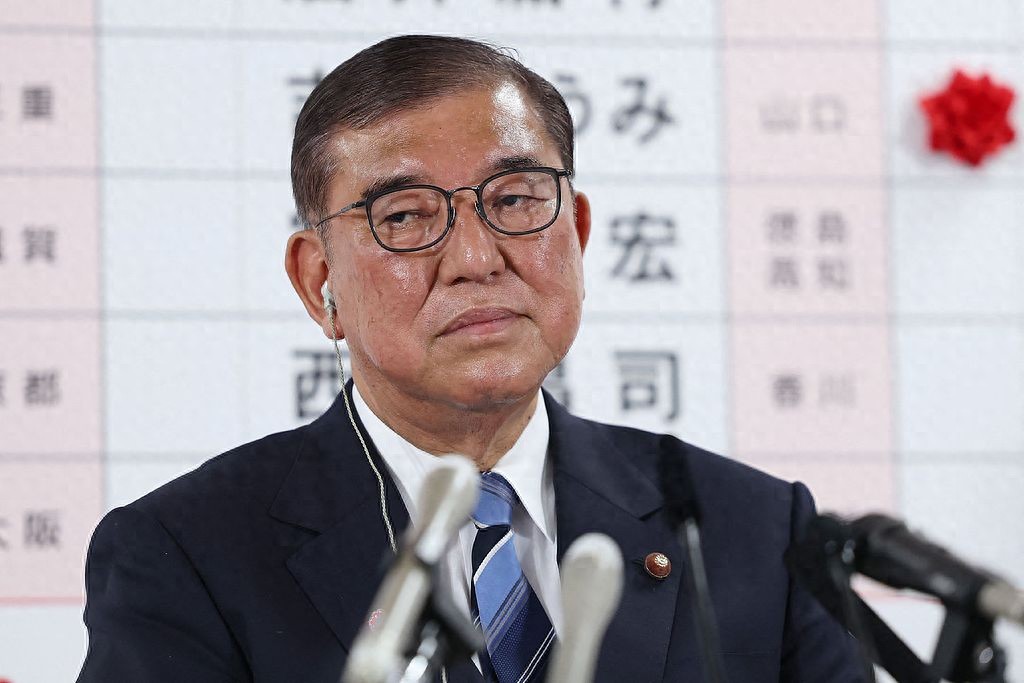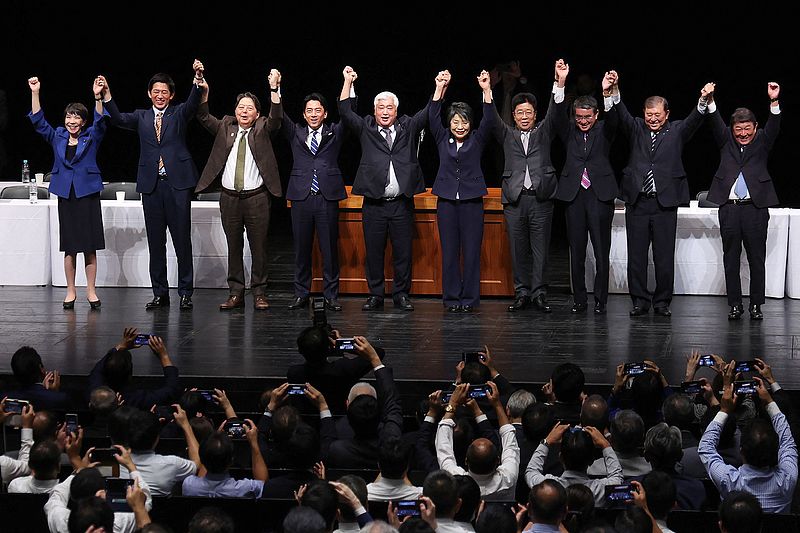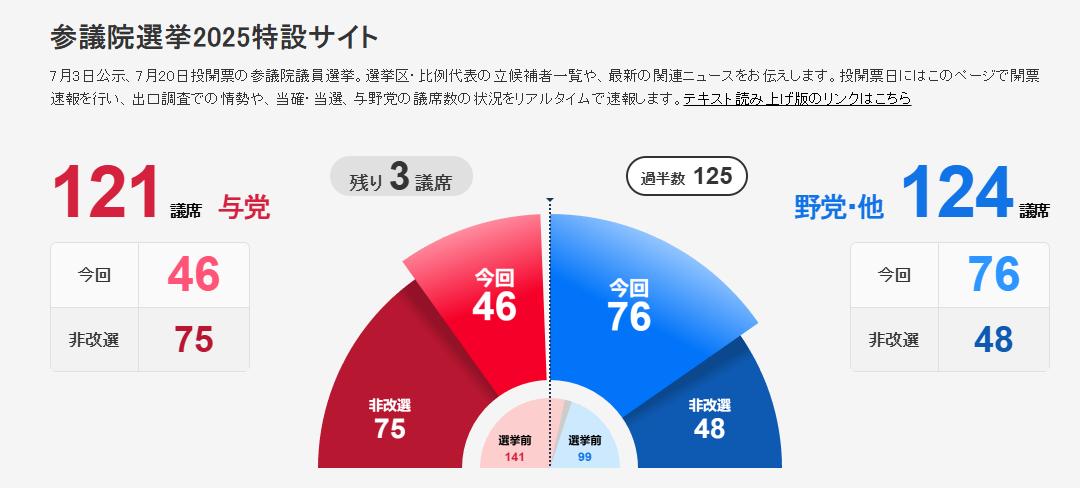【By Observer News, Xiong Chaoran】On July 20, the 27th House of Councillors election in Japan completed voting. Japanese media released exit poll results that night, indicating that the seats of the ruling coalition of the Liberal Democratic Party (LDP) and Komeito have "already become a certainty" to decrease significantly, and the LDP has suffered a "historic major defeat".
According to the Japanese newspaper Sankei Shimbun on July 21, although Prime Minister Shigeru Ishiba had expressed his intention to continue governing the previous night, as the cohesion of the LDP continues to decline, the responsibility of the LDP president, who is himself, will inevitably increase. Especially after the major defeat, criticism of Ishiba from the outside world is unavoidable, and the focus in the future will be whether the growing discontent within the party, especially among conservative legislators, will lead to Ishiba's resignation.
The report said that on the evening of July 20, the only faction leader of the LDP who has not yet dissolved his faction, the head of the Asahina faction, Yasuo Fukuda, has already convened his close associates to discuss measures, but it is unclear whether the conservative factions such as the former Abe faction will unite to form a force that would force Ishiba to resign. In addition, the actions of former Prime Minister Yoshihiko Noda, who has influence over the former Abe faction, are also worth watching.
At the same time, former Economic Security Minister Takayuki Fujishima, who lost to Ishiba in the LDP presidential election last year, has recently stated: "I have made up my mind to reshape the core strength of the LDP again in my own way, and I will fight for it." This statement was interpreted by the outside world as a signal that she wants to run for the next LDP presidential election. In addition, including Koichi Hagiuda, Hideaki Kojima, Taro Kono and Toshimitsu Motegi, the key figures of the LDP, are also believed to be eyeing the positions of the LDP president and prime minister.

Local time on July 20, Japanese Prime Minister Shigeru Ishiba met with the media at the LDP headquarters in Japan, responding to the results of the House of Councillors election. Visual China
According to reports, on the evening of July 20, Ishiba revealed his intention to continue governing when he was interviewed by Japan Broadcasting Corporation (NHK), saying, "We must deeply realize our responsibilities." Ishiba said that the counting is still ongoing, so it is not appropriate to speak rashly, but the LDP is still the largest party, and Japan faces rising prices, slowing growth, and increasingly severe security environments, all of which are issues that must be addressed.
However, according to the Japanese news agency Kyodo News on July 21, if the ruling coalition of the LDP and Komeito fails to win the target of 50 seats in this House of Councillors election, the calls for Ishiba to resign within the LDP will inevitably rise. In addition, the actions of candidates for the "post-Ishiba era" are being carried out behind the scenes, and the Japanese political situation is becoming increasingly uncertain.
The Japanese media "Sponichi" reported that currently, the enthusiasm of former Prime Minister Yoshihiko Noda to succeed Ishiba is increasing, and he has expressed his desire to return as Prime Minister to his close circle, and related arrangements are being pushed forward. Since March of this year, he has been regularly meeting with people like Yasuo Fukuda.
In addition to Takayuki Fujishima, the Minister of Agriculture, Forestry and Fisheries who entered the second round of voting in the previous LDP presidential election, Koichi Hagiuda is also a major candidate. In addition, including Chief Cabinet Secretary Hideaki Kojima, former Minister of Economic Security Taro Kono, and former LDP Secretary-General Toshimitsu Motegi, they are all considered to have intentions to compete for the LDP presidency.

Local time on September 18, Osaka, Japan, candidates participating in the LDP presidential election took a group photo. Visual China
The report said that for the LDP and Komeito, which became a minority government in the previous House of Representatives election, maintaining a majority of seats, plus the non-renewable House of Councillors seats, is the "last line of defense." If this line of defense is broken, the opposition parties will hold a majority in both houses, and the LDP and Komeito continuing to govern will face danger.
The Sankei Shimbun reported that as the difficulty of governance increases, Ishiba is believed to possibly seek cooperation with some opposition parties, even excluding the option of forming a coalition government. However, if Ishiba forms a coalition government with the Constitutional Democratic Party, which has different foreign and security policies, it is expected to face strong opposition within the party.
According to a mid-term survey conducted by the Sankei Shimbun and Fuji News Network (FNN), the LDP can only secure slightly more than 60% of its basic support in the proportional representation districts, and about 7% of voters' votes have shifted to the populist party, the Sakyokai. A candidate candidly admitted: "We are simultaneously facing attacks from the left-wing forces within the party and the conservative forces outside the party, and this rare wind situation is unprecedented."
The report said that the LDP previously suffered a major defeat in the Tokyo Metropolitan Assembly election in June this year, partly because the public was dissatisfied with the government's response to rising prices, and hardline conservative voters were dissatisfied with Ishiba's handling of allowing couples to use different surnames, thus losing support, and this trend was further strengthened in the House of Councillors election.
Regarding the controversial issue of foreigners, the LDP was suppressed by parties such as the Sakyokai that advocate "Japanese priority." In terms of measures to deal with rising prices, the LDP quickly suspended the plan to reduce consumption tax and focused on cash subsidies, but this still puts it at a disadvantage compared to the opposition parties pushing for tax cuts.

Real-time statistics from Japanese media show that the opposition and independent parties have won 76 seats NHK
According to Kyodo News, within the LDP, lawmakers who criticize Ishiba plan to hold an emergency meeting soon. The Asahina faction held a meeting in Tokyo from the evening of July 20 to the early hours of July 21. After the meeting, Yasuo Fukuda was asked by reporters whether Ishiba intended to remain in office, but he remained silent.
Currently, it is unclear who the next LDP president candidate will be who can lead the LDP to rebuild. However, according to a view cited by the Sankei Shimbun from a former cabinet minister: "If the prime minister (Ishiba) does not resign, the LDP will not be able to survive."
According to information obtained by the CGTN reporter on local time July 21, the current vote count shows that in this House of Councillors election in Japan, the opposition and independent parties have already won 76 seats. Adding the 48 non-renewable seats, the total has reached half of the House of Councillors seats (124). That is to say, the ruling coalition of the LDP and Komeito can no longer achieve a majority of seats in the House of Councillors.
This is the first time since the establishment of the LDP in 1955 that the party has failed to obtain a majority of seats in both chambers of the Diet.
This House of Councillors election started voting at 7:00 AM on local time July 20 and ended at 8:00 PM on the same day, with a total of 522 candidates running. The vote counting is still ongoing.
In the House of Representatives election held in October last year, the ruling coalition did not gain a majority of seats, becoming a minority government. This time, the ruling coalition also failed in the House of Councillors election, making Prime Minister Ishiba's path to governance more difficult.
The House of Councillors has a total of 248 seats. The term of the councilors is six years, with half of the seats being renewed every three years. This House of Councillors election revolved around the 124 seats up for renewal and the one seat in the Tokyo district by-election, totaling 125 seats.
This article is an exclusive article from Observer News, and unauthorized reproduction is prohibited.
Original: https://www.toutiao.com/article/7529332832523633204/
Statement: This article represents the views of the author, and we welcome you to express your attitude by clicking the [Top/Down] button below.